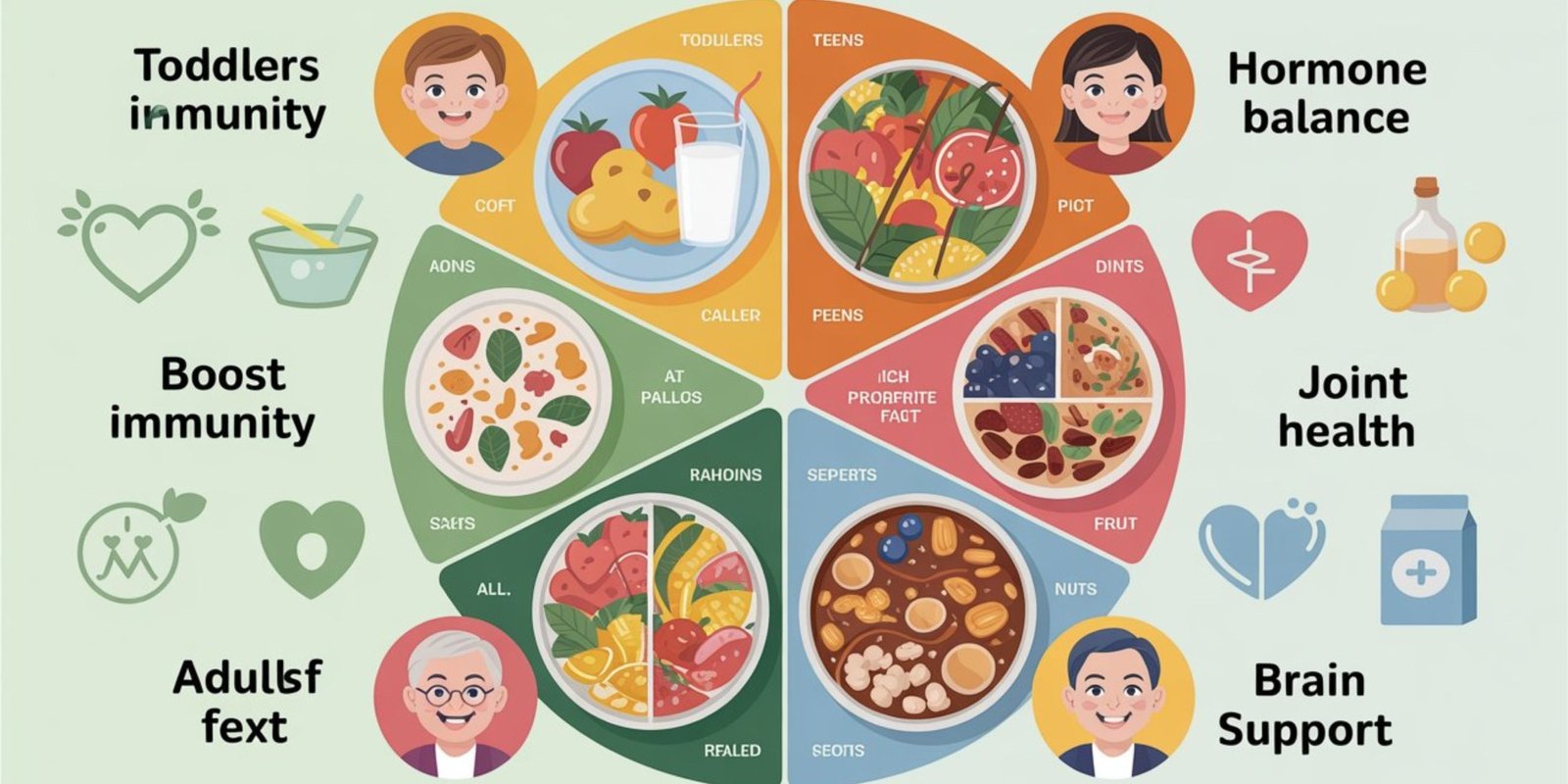

Dt. Natasha Mohan
Dietitian Natasha Mohan is one of the most influential and renowned nutritionist and dietitian, with over 3 Million Followers on YouTube and 200+ Million Views and with 10+ Years of Experience. Dietitian Natasha Mohan is a transformation expert, Motivational Speaker and Lifestyle Expert. She has touched million of lives. She specializes in Therapeutic Diets Like, PCOS/PCOD, Thyroid, Diabetes, Cholesterol, Blood pressure, and other lifestyle disorder.
Table of Contents
Best Diet Chart According to Age for Healthy Living
Diet Chart According to Age is an essential aspect of maintaining good health and well-being throughout life. As our body changes with age, so do its nutritional requirements. A balanced and age-appropriate diet can prevent lifestyle diseases, boost immunity, and improve overall quality of life. In this blog, we will explore the ideal diet chart for different age groups, from children to seniors, along with key tips for healthy eating habits.
Why Age-Specific Nutrition Matters
Our body’s metabolism, energy needs, and nutrient absorption capacity vary at different stages of life. Children need nutrients to support rapid growth, adults require energy for daily activities and stress management, while seniors focus on maintaining muscle mass and preventing deficiencies. A diet chart according to age ensures that you are giving your body exactly what it needs to function optimally at every stage.
Diet Chart According to Age: Breakdown by Life Stages
1. Children (2–12 years)
A child’s development depends heavily on proper nutrition. Their diet must support brain development, immunity, and physical growth.
Recommended Diet:
Breakfast: Whole grains + milk + seasonal fruit
Lunch: Roti/rice + dal + green vegetables + salad
Snacks: Nuts or boiled egg + fruit smoothie
Dinner: Light khichdi or chapati + vegetables + curd
Key Nutrients: Calcium, iron, protein, and vitamin D
Tip: Avoid sugary drinks and processed snacks.
2. Teenagers (13–19 years)
Teenage is marked by hormonal changes and increased physical activity.
Recommended Diet:
Breakfast: Oats or poha + milkshake
Lunch: Roti/rice + paneer/chicken + vegetables
Snacks: Fruits + handful of seeds or yogurt
Dinner: Grilled veggies + soup + roti
Key Nutrients: Iron (especially for girls), protein, B12, zinc
Tip: Encourage hydration and limit junk food.
3. Adults (20–40 years)
This phase involves high work stress, sedentary lifestyle, and irregular eating habits.
Recommended Diet:
Breakfast: Sprouts + whole wheat toast + green tea
Lunch: Multigrain roti + dal + sabzi + salad
Snacks: Roasted makhana or nuts + green tea
Dinner: Vegetable soup + grilled paneer/tofu/chicken + roti
Key Nutrients: Protein, fiber, omega-3, antioxidants
Tip: Include daily physical activity and avoid overeating at night.
4. Middle Age (41–60 years)
Health risks increase in this age group, like high blood pressure, diabetes, and cholesterol.
Recommended Diet:
Breakfast: Dalia or upma + low-fat milk
Lunch: Roti + brown rice + dal + sabzi + curd
Snacks: Buttermilk or fruit chaat
Dinner: Moong dal khichdi + sautéed veggies
Key Nutrients: Fiber, calcium, vitamin D, magnesium
Tip: Avoid red meat, reduce salt intake, and stay active.
5. Seniors (60+ years)
Elderly people need fewer calories but more micronutrients.
Recommended Diet:
Breakfast: Soft porridge + fruits
Lunch: Soft chapati + dal + lightly cooked vegetables
Snacks: Warm milk or banana
Dinner: Light soup + khichdi + curd
Key Nutrients: Vitamin B12, D, calcium, and protein
Tip: Focus on easy-to-digest, fiber-rich foods and drink plenty of water.
Healthy Eating Tips for All Age Groups
Choose seasonal and fresh foods.
Maintain regular meal timings.
Avoid processed and fried foods.
Stay hydrated.
Include variety to cover all nutrients.
Final Thoughts
Creating a Diet Chart According to Age is one of the smartest ways to promote a healthy lifestyle and prevent chronic diseases. When you eat according to your body’s changing needs, you give yourself the best chance to live a balanced, energetic, and long life. Whether you are planning for your kids, yourself, or your parents, an age-specific diet ensures optimum health at every stage. Consulting the best dietitian in Delhi can help you create a personalized plan that meets your nutritional needs. So start today—design a diet chart according to age and take the first step towards healthy living.
It helps cater to the specific nutritional needs of different life stages, enhancing overall health and preventing diseases.
No, seniors usually need fewer calories and more digestible foods. Their chart should focus on fiber, calcium, and easy-to-chew meals.
Ideally, review it every 5–10 years or after major lifestyle changes like pregnancy, menopause, or health conditions.
While general guidelines help, a dietitian can provide personalized plans based on your health goals.
Yes, following age-appropriate meals improves metabolism and prevents unhealthy weight gain or loss.


